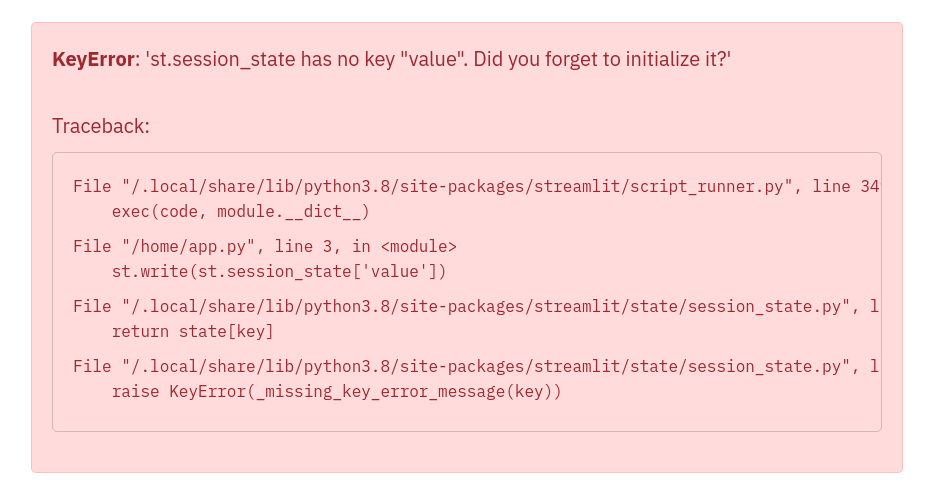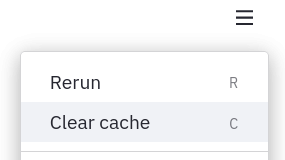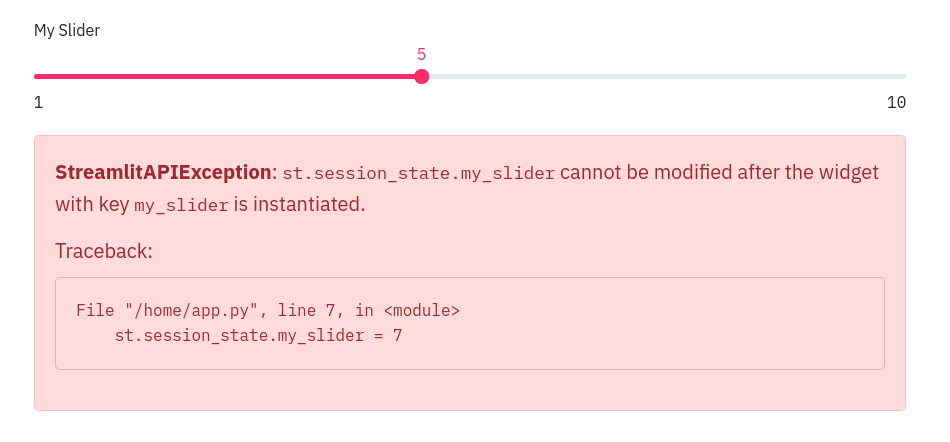Session State
Session State is a way to share variables between reruns, for each user session. In addition to the ability to store and persist state, Streamlit also exposes the ability to manipulate state using Callbacks. Session state also persists across apps inside a multipage app.
Check out this Session State basics tutorial video by Streamlit Developer Advocate Dr. Marisa Smith to get started:
Initialize values in Session State
The Session State API follows a field-based API, which is very similar to Python dictionaries:
Reads and updates
Read the value of an item in Session State and display it by passing to st.write :
Update an item in Session State by assigning it a value:
Curious about what is in Session State? Use st.write or magic:
Streamlit throws a handy exception if an uninitialized variable is accessed:

Delete items
Delete items in Session State using the syntax to delete items in any Python dictionary:
Session State can also be cleared by going to Settings → Clear Cache, followed by Rerunning the app.

Session State and Widget State association
Every widget with a key is automatically added to Session State:
Use Callbacks to update Session State
A callback is a python function which gets called when an input widget changes.
Order of execution: When updating Session state in response to events, a callback function gets executed first, and then the app is executed from top to bottom.
Callbacks can be used with widgets using the parameters on_change (or on_click), args, and kwargs:
Parameters
- on_change or on_click - The function name to be used as a callback
- args (tuple) - List of arguments to be passed to the callback function
- kwargs (dict) - Named arguments to be passed to the callback function
Widgets which support the on_change event:
st.checkboxst.color_pickerst.date_inputst.data_editorst.file_uploaderst.multiselectst.number_inputst.radiost.select_sliderst.selectboxst.sliderst.text_areast.text_inputst.time_inputst.toggle
Widgets which support the on_click event:
st.buttonst.download_buttonst.form_submit_button
To add a callback, define a callback function above the widget declaration and pass it to the widget via the on_change (or on_click ) parameter.
Forms and Callbacks
Widgets inside a form can have their values be accessed and set via the Session State API. st.form_submit_button can have a callback associated with it. The callback gets executed upon clicking on the submit button. For example:
Serializable Session State
Serialization refers to the process of converting an object or data structure into a format that can be persisted and shared, and allowing you to recover the data’s original structure. Python’s built-in pickle module serializes Python objects to a byte stream ("pickling") and deserializes the stream into an object ("unpickling").
By default, Streamlit’s Session State allows you to persist any Python object for the duration of the session, irrespective of the object’s pickle-serializability. This property lets you store Python primitives such as integers, floating-point numbers, complex numbers and booleans, dataframes, and even lambdas returned by functions. However, some execution environments may require serializing all data in Session State, so it may be useful to detect incompatibility during development, or when the execution environment will stop supporting it in the future.
To that end, Streamlit provides a runner.enforceSerializableSessionState configuration option that, when set to true, only allows pickle-serializable objects in Session State. To enable the option, either create a global or project config file with the following or use it as a command-line flag:
By "pickle-serializable", we mean calling pickle.dumps(obj) should not raise a PicklingError exception. When the config option is enabled, adding unserializable data to session state should result in an exception. E.g.,

Warning
When runner.enforceSerializableSessionState is set to true, Session State implicitly uses the pickle module, which is known to be insecure. Ensure all data saved and retrieved from Session State is trusted because it is possible to construct malicious pickle data that will execute arbitrary code during unpickling. Never load data that could have come from an untrusted source in an unsafe mode or that could have been tampered with. Only load data you trust.
Caveats and limitations
-
Streamlit Session State is tied to a WebSocket connection. When a user reloads the browser tab or navigates using a Markdown link, the WebSocket connection and the associated Session State data are reset.
-
Only the
st.form_submit_buttonhas a callback in forms. Other widgets inside a form are not allowed to have callbacks. -
on_changeandon_clickevents are only supported on input type widgets. -
Modifying the value of a widget via the Session state API, after instantiating it, is not allowed and will raise a
StreamlitAPIException. For example:Python
-
Setting the widget state via the Session State API and using the
valueparameter in the widget declaration is not recommended, and will throw a warning on the first run. For example:Python
-
Setting the state of button-like widgets:
st.button,st.download_button, andst.file_uploadervia the Session State API is not allowed. Such type of widgets are by default False and have ephemeral True states which are only valid for a single run. For example:Python
Still have questions?
Our forums are full of helpful information and Streamlit experts.

